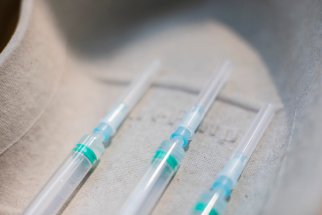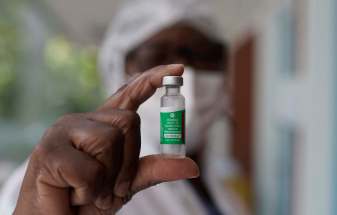Unreasonable expectations: COVID-19 exposes holes in vaccine production, distribution
Read this article for free:
or
Already have an account? Log in here »
To continue reading, please subscribe:
Monthly Digital Subscription
$0 for the first 4 weeks*
- Enjoy unlimited reading on winnipegfreepress.com
- Read the E-Edition, our digital replica newspaper
- Access News Break, our award-winning app
- Play interactive puzzles
*No charge for 4 weeks then price increases to the regular rate of $19.00 plus GST every four weeks. Offer available to new and qualified returning subscribers only. Cancel any time.
Monthly Digital Subscription
$4.75/week*
- Enjoy unlimited reading on winnipegfreepress.com
- Read the E-Edition, our digital replica newspaper
- Access News Break, our award-winning app
- Play interactive puzzles
*Billed as $19 plus GST every four weeks. Cancel any time.
To continue reading, please subscribe:
Add Free Press access to your Brandon Sun subscription for only an additional
$1 for the first 4 weeks*
*Your next subscription payment will increase by $1.00 and you will be charged $16.99 plus GST for four weeks. After four weeks, your payment will increase to $23.99 plus GST every four weeks.
Read unlimited articles for free today:
or
Already have an account? Log in here »
Hey there, time traveller!
This article was published 01/02/2021 (1780 days ago), so information in it may no longer be current.
No one should be shocked about the recent shortages of COVID-19 vaccine. It would have been shocking if there wasn’t a bottleneck that ground vaccinations to a halt in countries such as Canada.
Long before COVID-19, there were concerns about the world’s ability to produce and distribute lifesaving vaccines and medicines.
The pharmaceutical industry has undergone a profound consolidation, which has given a handful companies a market stranglehold on even the most basic of product. Even though there has been multilateral progress in achieving a more equitable distribution through entities such as GAVI (formerly the Global Alliance of Vaccine Initiatives), there are still many countries going without.
The World Health Organization publishes an annual audit of vaccine supplies in 132 countries. In its 2019 report, 56 countries reported running out of at least one vaccine; 34 reported running out of two or more basic vaccines.
While poorer countries are more likely to experience vaccine shortfalls, wealthier nations, from time to time, also have their stockpiles exhausted.
Suddenly: a global health emergency that requires all of the world’s people to be vaccinated against the same virus, at the same time.
For an industry that has undergone profound change, and which has historically struggled to provide sufficient supply and equitable access, shortages of COVID-19 vaccine were as predictable as, well, the pandemic itself.
Given the complexity of the technology, manufacturing limitations, and the shortage of supplies needed to get doses into people’s arms, it now seems pretty obvious pharmaceutical companies and political leaders created unreasonable expectations about how quickly people could be vaccinated.
Yet, there are some particular challenges.
For experts such as Dr. Alan Bernstein, a member of the federal government’s vaccine task force, it is a combination of the unique nature of the technology behind the COVID-19 vaccines, combined with systemic issues related to production and distribution.
Bernstein has spent a lifetime working to promote vaccine development, and currently sits on the scientific advisory committee for the Bill & Melinda Gates Foundation. Even before a single COVID-19 dose had been approved, Bernstein was doing interviews and writing op-ed pieces cautioning Canadians about the enormous complexity and numerous pitfalls of a vaccine distribution of this magnitude.
“There have definitely been some hiccups,” Bernstein said.
The first and foremost challenge is the fact the two most-used vaccines — Pfizer-BioNTech and Moderna — rely on relatively new RNA technology. So new, in fact, it has never been subjected to a mass production process.
It is causing some growing pains, as manufacturers attempt to scale-up facilities built to make thousands of doses to suddenly produce hundreds of millions of doses.
It’s also important to note a “shortage” may not refer to an actual shortfall in the amount of vaccine. The inability to procure the vials and syringes needed to mix and administer the vaccines has also contributed to delays.
However, Bernstein argued the pace at which the residents of wealthier nations such as Canada get immunized may not be its most pressing vaccine-related challenge.
Given the complexity of the technology, manufacturing limitations, and the shortage of supplies needed to get doses into people’s arms, it now seems pretty obvious pharmaceutical companies and political leaders created unreasonable expectations about how quickly people could be vaccinated.
As soon as vaccines were approved for use, governments began boasting about the number of doses that could be produced and the number of doses that had been purchased. These statements implied a scenario in which there would be no delays.
However, Bernstein argued the pace at which the residents of wealthier nations such as Canada get immunized may not be its most pressing vaccine-related challenge.
Given the nature of the SARS-CoV-2 virus, developed countries should be as concerned about how quickly vaccine is getting to people living in poorer countries, he said. Many developing countries are struggling to get even modest shipments, which have largely been snapped up by wealthier counterparts.
The longer the novel coronavirus is left to mutate, the more variants will emerge, Bernstein said. The more variants, the greater the likelihood the first generation of vaccines will not be sufficient to contain the pandemic.
Many developing countries are struggling to get even modest shipments, which have largely been snapped up by wealthier counterparts.
As more supplies become available, countries such as Canada will need to start donating a share of every shipment to be used in a developing nation, Bernstein said. Otherwise, even being able to vaccinate every Canadian by Labour Day, as the federal government has promised, may not be enough to actually halt the pandemic.
“Even with five vaccines (potentially approved), we don’t really know when the pandemic is going to end because of the arrival of the variants,” Bernstein said.
“It could be that we need to be immunized every year, like the flu shot. Or that we’ll need booster shots to maintain the efficacy of the vaccines.”
The world has made many tragic mistakes when it comes vaccine production and distribution.
Given most experts believe it is likely to face other pandemic threats in the near future, Bernstein said: “We need to learn from what’s going on now and make sure we do better next time. Because there will be a next time.”
dan.lett@freepress.mb.ca

Born and raised in and around Toronto, Dan Lett came to Winnipeg in 1986, less than a year out of journalism school with a lifelong dream to be a newspaper reporter.
Our newsroom depends on a growing audience of readers to power our journalism. If you are not a paid reader, please consider becoming a subscriber.
Our newsroom depends on its audience of readers to power our journalism. Thank you for your support.
History
Updated on Monday, February 1, 2021 8:10 PM CST: Fixes typo










